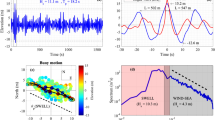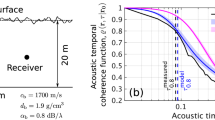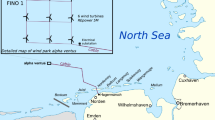Abstract
THE Doppler frequency shift of radio waves reflected from the sea surface at 13.56 Mc./s. has been recorded and a portion of a typical record is shown in Fig. 1. Such records show the following unexpected features: (a) the frequency of the principal component (as initially obtained by measurement of the length of individual cycles on the record) is surprisingly constant at about 0.38 c./s., irrespective of wind conditions and state of the sea; (b) the records show that the range of frequencies present is small. Spectrum analysis of the records made with an Admiralty wave analyser1 confirmed these findings. Fig. 2 is a reproduction of a sample spectrum analysis which shows a large but narrow peak at a frequency of 0.38 c./s. accompanied by a smaller peak at a frequency of about 0.54 c./s.
This is a preview of subscription content, access via your institution
Access options
Subscribe to this journal
Receive 51 print issues and online access
$199.00 per year
only $3.90 per issue
Buy this article
- Purchase on Springer Link
- Instant access to full article PDF
Prices may be subject to local taxes which are calculated during checkout
Similar content being viewed by others
References
Barber, N. F., Nature, 158, 329 (1946).
Russel, R. C. H., and MacMillan, D. H., “Waves and Tides”, 58 (Hutchinson, London, 1952).
Author information
Authors and Affiliations
Rights and permissions
About this article
Cite this article
CROMBIE, D. Doppler Spectrum of Sea Echo at 13.56 Mc./s.. Nature 175, 681–682 (1955). https://doi.org/10.1038/175681a0
Issue Date:
DOI: https://doi.org/10.1038/175681a0
This article is cited by
-
A new model for Doppler shift of C-band echoes backscattered from sea surface
Acta Oceanologica Sinica (2023)
-
Variational interpolation of high-frequency radar surface currents using DIVAnd
Ocean Dynamics (2021)
-
Gaps Filling in HF Radar Sea Surface Current Data Using Complex Empirical Orthogonal Functions
Pure and Applied Geophysics (2020)
-
Tsunami detection by high-frequency radar in British Columbia: performance assessment of the time-correlation algorithm for synthetic and real events
Ocean Dynamics (2018)
-
Tsunami Detection by High Frequency Radar Beyond the Continental Shelf: II. Extension of Time Correlation Algorithm and Validation on Realistic Case Studies
Pure and Applied Geophysics (2017)
Comments
By submitting a comment you agree to abide by our Terms and Community Guidelines. If you find something abusive or that does not comply with our terms or guidelines please flag it as inappropriate.



